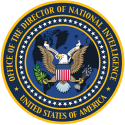Our website is made possible by displaying online advertisements to our visitors.
Please consider supporting us by disabling your ad blocker.
Director of National Intelligence
| Director of National Intelligence | |
|---|---|
 Seal of the Director of National Intelligence | |
since January 25, 2025 | |
| Office of the Director of National Intelligence | |
| Style | Madam Director (informal) The Honorable (formal) |
| Member of | Cabinet National Security Council Homeland Security Council |
| Reports to | President of the United States |
| Seat | Washington, D.C. |
| Appointer | President of the United States with Senate advice and consent |
| Constituting instrument | 50 U.S.C. § 3023 |
| Precursor | Director of Central Intelligence (DCI) |
| Formation | December 17, 2004 |
| First holder | John Negroponte |
| Deputy | Principal Deputy Director (P/DDNI) |
| Website | www |
The Director of National Intelligence (DNI) is a cabinet-level United States government official and is the director of the Office of the Director of National Intelligence (ODNI). The position required by the Intelligence Reform and Terrorism Prevention Act of 2004 to serve as executive head of the United States Intelligence Community (IC) and to direct and oversee the National Intelligence Program (NIP). All 18 IC agencies, including the Central Intelligence Agency (CIA), the Defense Intelligence Agency (DIA) and the National Security Agency (NSA), report directly to the DNI.
The DNI also serves, upon invitation, as the principal advisor to the president of the United States, the National Security Council, and the Homeland Security Council on all intelligence matters. The DNI, supported by the ODNI, produces the President's Daily Brief (PDB), a classified document including intelligence from all IC agencies, handed each morning to the president of the United States.[1]
President George W. Bush strengthened the role of the DNI on July 30, 2008, with Executive Order 13470,[2] which, among other things, solidified the DNI's legal authority to direct intelligence gathering and analysis, and to set policy for intelligence sharing with foreign agencies and for the hiring and firing of senior intelligence officials.[3] The DNI was given further responsibility for the entire IC's whistleblowing and source protection by President Obama via Presidential Policy Directive 19 on October 10, 2012.
Under 50 U.S.C. § 3026, "under ordinary circumstances, it is desirable" that either the director or the principal deputy director of national intelligence be an active-duty commissioned officer in the armed forces or have training or experience in military intelligence activities and requirements. Only one of the two positions can be held by a military officer at any given time. The statute does not specify what rank the commissioned officer will hold during their tenure in either position. The DNI, who is appointed by the president of the United States and is subject to confirmation by the United States Senate, serves at the pleasure of the president.
The position was elevated to a cabinet-level role during the first presidency of Donald Trump, a status it retained under President Joe Biden. Currently, the DNI attends all cabinet meetings and liaises with the Executive Office of the President of the United States and other Cabinet secretaries in the execution of their duties. President Donald Trump nominated Tulsi Gabbard to the position in 2025.[4]
- ^ "CIA to Cede President's Brief to Negroponte", February 19, 2005, The Washington Post
- ^ "Executive Order 13470". Federal Register. National Archives and Records Administration. July 30, 2008. Retrieved November 22, 2016.
- ^ Strohm, Chris (August 1, 2008). "Bush Orders Intelligence Overhaul". CongressDaily. Retrieved November 22, 2016 – via republished by Nuclear Threat Initiative at NTI.org.
- ^ Peterson, Beatrice. "Senate committee advances Tulsi Gabbard's nomination to be intel chief". ABC News. Retrieved February 5, 2025.
Previous Page Next Page
مدير الاستخبارات الوطنية (الولايات المتحدة) Arabic Director of National Intelligence German ادارهکننده اطلاعات ملی FA Directeur du renseignement national French ראש המודיעין הלאומי HE Direktur Intelijen Nasional Amerika Serikat ID アメリカ合衆国国家情報長官 Japanese 미국 국가정보장실 Korean Nacionalinės žvalgybos direktorius LT Directeur van de Nationale Inlichtingendiensten Dutch



